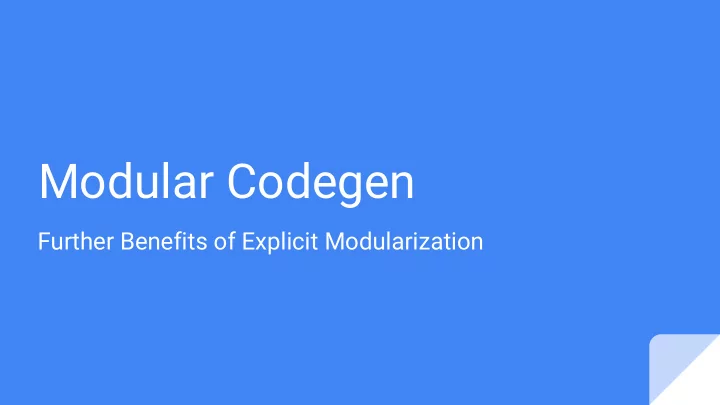

Modular Codegen Further Benefits of Explicit Modularization
Module Flavours
#ifndef FOO_H Motivating #define FOO_H Example inline void foo() { ... } #endif #include "foo.h" #include "foo.h" void bar() { void baz() { foo(); foo(); } }
Implicit Modules ● User writes .modulemap files module foo { header "foo.h" export * }
Build System Implicit Modules Build Process bar.cpp baz.cpp clang++ clang++
Build System Implicit Modules Build Process bar.cpp baz.cpp foo.mm clang++ clang++ clang++ foo.pcm
Build System Implicit Modules Build Process bar.cpp baz.cpp foo.mm clang++ clang++ clang++ foo.pcm bar.o baz.o
Implicit Modules ● User writes .modulemap files ● Compiler finds them and implicitly builds module descriptions in a filesystem cache Build system agnostic ● Difficult to parallelize - build system isn’t aware of the dependencies ● ● Doesn’t distribute (clang doesn’t know about distribution scheme)
Explicit Modules ● Build system explicitly invokes the compiler on .modulemap files ● Passes resulting .pcm files when compiling .cpp files for use
Explicit Modules Build System Build Process foo.mm clang++ foo.pcm
Explicit Modules Build System Build Process foo.mm clang++ bar.cpp foo.pcm baz.cpp clang++ clang++ bar.o baz.o
Modules TS (Technical Specification) ● New file type (C++ with some new syntax - .cppm?) ● New import syntax Also needs build system support ●
Modular Codegen
foo.mm Duplication in Object Files bar.cpp foo.pcm baz.cpp Each object file contains independent definitions of: bar.o baz.o ● Uninlined ‘inline’ functions (& ● ● bar() baz() some other bits) ● ● f1() f1() ● Debug information descriptions of classes a.out ● bar() ● baz() ● f1()
foo.mm Modular Objects baz.cpp bar.cpp foo.pcm The module can be used as a ‘home’ for these entities so they don’t need to be carried by every user. bar.o foo.o baz.o ● ● ● bar() f1() baz() a.out ● bar() ● baz() ● f1()
foo.mm Risks baz.cpp bar.cpp foo.pcm Unused entities may increase linker inputs. foo.o ● f1() bar.o baz.o ● f2() ● ● bar() baz() ● f3() a.out ● bar() ● baz() ● f1()
Constraints ● Headers are compiled separately (& only once) from uses ● Dependencies must be well formed Headers cannot be implemented by a different library - they form circular dependencies no ○ longer broken by duplicated definitions at every use.
Diversion: ‘How Unix Linkers Work (lite)’ void a1() { b(); } void b() { a2(); } void a2() { … }
Diversion: ‘How Unix Linkers Work (lite)’ void a1() { b(); } void b() { a2(); } void a2() { … } a1()?
Diversion: ‘How Unix Linkers Work (lite)’ void a1() { b(); } void b() { a2(); } void a2() { … } a1() ✓ a1()? b()?
Diversion: ‘How Unix Linkers Work (lite)’ void a1() { b(); } void b() { a2(); } void a2() { … } a1() ✓ a1() ✓ a1()? b() ✓ b() ? a2()?
Diversion: ‘How Unix Linkers Work (lite)’ void a1() { b(); } void b() { a2(); } void a2() { … } a1() ✓ a1() ✓ a1() ✓ a1()? b() ✓ b() ✓ a2() ❌ b() ? a2()?
Clang/LLVM Codebase ● *.def files are textual/non-modular lib/Support/regc* are non-modular ● ● MCTargetOptionsCommandFlags.h non-modular CommandFlags.h non-modular ● ● Target ASM Parsers depend on MC Target Description static namespace-scope functions in headers -> inline, non-static ● ● Missing #includes No idea what to do with abi-breaking.h ● ● Weird things in Hexagon (non-modular headers that are included exactly once…) ASTMatchers defining global variables in headers… no idea how this isn’t causing link errors, ● maybe they’ve got implicit internal linkage.
Results
Object Section Sizes -O0 -fmodules-codegen -gsplit-dwarf
Object Section Sizes -O0 -fmodules-codegen -gsplit-dwarf
Object Section Sizes -O0 -fmodules-codegen -gsplit-dwarf
Object Section Sizes -O0 -fmodules-codegen -gsplit-dwarf
-O3
Further Work ● Other aspects needed for Modules TS ○ Variables (implemented - could be backported to non-TS style, may not be needed) ○ ??? ● Avoid homing alwaysinline functions (maybe other reasonable inlining heuristics to avoid homing functions unlikely to remain uninlined) Avoid type units when a home is likely to be unique (not an implicit ● template instantiation, or has a strong vtable, etc)
Thanks! David Blaikie Email/etc: dblaikie@gmail.com Twitter: @dwblaikie
20% Use this slide to show a major stat. It can help enforce the presentation’s main message or argument.
This is the most important takeaway that everyone has to remember.
Final point A one-line description of it
“This is a super-important quote” - From an expert
Recommend
More recommend